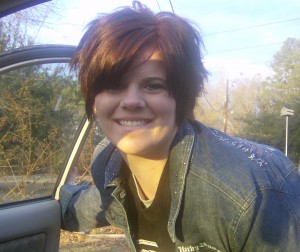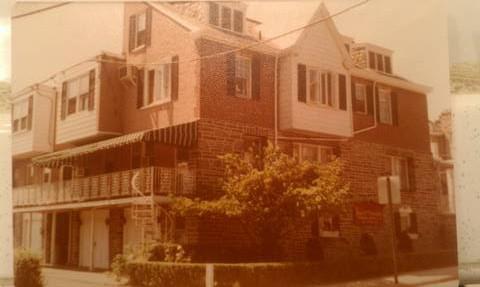Miscellaneous
I Buried my Best Friend Yesterday :: A Guest Post
Today’s guest post is from Brigid. Brigid is from a small Louisiana town. She is currently pursuing a graduate degree in Psychology. Passions of hers other than Psychology include creative writing, reading, playing Dungeons and Dragons, and bird-watching. She has a pet dachshund and a zebra finch. Brigid writes poetry, prose, and random thoughts at her blog, Scraps of Madness: http://scrapsofmadness.
Make sure you give Brigid your like at her facebook page, Brigid Mochroi – writer.
*****
I buried my best friend yesterday. It was the hardest, most intense and exhausting experience of my life. I knew her since Kindergarten. She was the first friend I ever made. We grew up together. Our lives have been intertwined since we met. Her name was Aimee. She has influenced me more than I can even fathom. But I can pluck out her greatest lessons. And I want to share them with you.
Aimee was born with a kidney illness. She was not supposed to live past infancy. Then she was not supposed to live past childhood. But she defied the odds and made it 28 years. And no matter how sick she got, how bad off she was in the hospital now and then, she always bounced back. Yes, she would have moments where she got frustrated at her medical conditions, but she NEVER let any of her conditions define her. She pushed the limits.
I remember recently, when she was beginning dialysis 3 days a week, a big rock fest came into the town she was living in. She went to it and partied the whole time it was in town. That’s the kind of person she was. She never passed up an opportunity to have fun. And she never met a stranger. She made friends with everybody. Upon meeting her, most people had no idea of the health struggles she faced on a day to day basis. Her illness was something she had to deal with, but it was never who she was.
Aimee’s greatest lesson was in her example of how she made the best of any situation. She had a strength and resiliency that most of us can’t even imagine. She was fire and lightening. Full of pure energy, life, and love. And no matter what she was going through, she was always there for you if you needed anything. She lived to help people and would give you the shirt off her back if she thought you needed it more.
We always knew it was a possibility that she was destined for a shorter time on this earth than we would have liked. But we also understood that she was already defying the odds by having survived infancy and childhood. She focused on the present and on enjoying every moment she could. She and I only had the death conversation a handful of times in all these years. She would not talk about it for long. She did not like to waste time dwelling on things out of her control and she did not want to worry anyone else.
“I know my kidney could stop working any day. I know that I’m lucky I’ve made it this far. I know that I could die anytime. I don’t like to think about it, nobody likes to think about that kind of thing. But I’m here right now and I’m going to make the best of whatever time I have.” That was what she said to me. And that was as far as the discussion went.
She truly did live life exactly as she pleased. Grasping each moment with full awareness and making the absolute best of it. I think that inner strength was a large part of why she defied the odds.
She passed away suddenly in her sleep. The end did not come as we all feared it would. We all feared it would come after weeks of lingering in the hospital and hooked up to machines. We all feared it would be the end to a long drawn out suffering death process.
Yes, she had been in and out of the hospital a lot lately for various reasons, but she was functioning well. She had just been on several short vacations recently. She had just gotten engaged. Her mother and father told me they just saw her and she was her usual energetic and happy self.
She just went to bed one night during the happiest point in her life and slipped away in her sleep. And I think if she had been given the choice of going that way versus going the way we all feared, she would have chosen this. This was yet another blessing. Even in dying, she defied the odds and made the best out of a bad situation.
I hope that I have captured some degree of her shining example in this post. I hope that by posting this, her influence will be extended to those who never had the honor and pleasure of being part of her life. She lived to help people. And by writing this, I want to give her the chance to continue to help people.
We all agreed that instead of sending flowers to Aimee’s funeral we wanted to encourage everyone to donate to the National Kidney Foundation or the Ronald McDonald House in her name. I hope that some of you will be compelled to make a donation to help these causes. They were very important to her. If there is another cause that is of particular importance, then consider making a donation to whatever that may be. Aimee was all about helping people in whatever way possible. Another great lesson in life.
In conclusion, I want to share a lesson I have learned from this experience of loss. Losing someone close to you is the hardest pain you can imagine. But the pain comes from how close you were to that person and how much you loved them. Yet, you never regret the closeness. The things you regret are missed opportunities to see them, the times you put off calls or visits, or the things you had planned that never came about. You never regret loving as hard as you can.
Lift & Roll
Today’s guest post comes from Celeste Donohue. Celeste is a writer/comedian who lives in Los Angeles and is also the daughter of a 3rd generation funeral director. Her blog “Death To Hollywood” is about her life growing up in a funeral home and her current life in Hollywood.
****
The way we brought the bodies in to the morgue was through the alley (SEE PHOTO to the right). There were big white doors (with brass door knobs of course) that would open wide enough to bring the stretcher in. For everyone else on our street, it was their garage. So technically, the morgue was in the garage that was connected to the basement. After the person was embalmed and dressed, we had a motorized lift to take the dead people up from the basement to the first floor. My dad told me that before it was a lift, it was an electronic chair for my grandfather to go upstairs after he had a stroke. Once my dad built the morgue in the basement he took the chair off and replaced it with a piece of wood that he could lay the bodies on.
That lift was fun. When I was really little my dad would let me ride it. I’d sit on it and he would turn the switch on and I’d start to go up the stairs. There was a light bulb on the other side of the steps that I used to pretend was the moon and I was an astronaut on my way up to the moon. Normal kid stuff, if you consider riding a lift for dead bodies normal.
That lift was later replaced with another one that was much more elaborate and cool. The new one actually came up through the floor of the parlor so that the body would already be in the casket and ready for their big day. The other lift couldn’t have held a casket, just a body. Once everything was in place; flowers, etc. no one would know that the lift was underneath the casket.
One time the body came up through the floor, was in the casket and everything seemed fine until the leg of the stand underneath the casket collapsed. We were upstairs watching TV when we heard a loud thud followed by my dad yelling a string a curse words. That may have been one of the few times I heard him say “fuck,” except he yelled it. The leg collapsed, the casket fell and the body rolled out. Luckily this didn’t happen during a funeral, it happened while he was setting up, but the family was due there soon so my dad was freaking out. Naturally, we ran downstairs and the dead lady was in the middle of the floor.
Dead bodies aren’t really fit for moving around once they’re in the casket because they’re so stiff. The body was facing down and when my dad rolled her over, her hands were still folded. Can you picture that? It was funny because people who are alive are just the opposite. My dad wasn’t able to laugh about that one right away, but we did.
Of course, my dad and brother got her back into the casket and everything was fine after she had a slight touch up. The family never knew that their loved one had been face down in the middle of the floor in her fancy dress a couple hours before that. And that’s for the best because there really isn’t room for a lot of error when it comes to a funeral. People are so distraught they probably wouldn’t find it funny to watch a dead body roll out of a casket.
When Our Memories Smell Like Us
Four months after Newtown, People magazine has published a series called, “Life After Newtown Shootings” where the parents describe their grief and how they are coping. It’s a beautiful series and well-worth your time and the three dollar Kleenex box that you’ll go through.
One of the parents mentions that she still sleeps with her son’s pajamas so that she can be soothed by “his smell.” Certainly, considering the tragedy of Newtown, there is nothing abnormal about her practice. In fact, it’s healthy and I can’t help but feel the heaviness of her grief as I think about it.
Here’s a question: A what point has her son’s smell disappeared and what she thinks is her son’s smell is actually her own smell. At what point in sleeping with his pajamas have they stopped smelling like her son and started to smell like her?
At funerals, you’ll often hear people say, “Cathy lives on in all of our memories” or, “Cathy will never die as longs as we remember her.”
There’s a difficulty that comes with remembering our loved one.
I remember an old man, who was married to his late wife for over 50 years, stopped into funeral home to pay his bill and he said, “I both grieve the loss of my wife and the distortion of my memories of her. Even now, when I remember her, I ask myself, “Is this memory real or is it my mind’s adaptation of her? I only want to remember the good, but I miss the bad and messy nearly as much because it’s who she was.”
There’s a time when the smell on the pajamas becomes our own. There’s a time when memories are distorted by our desires for comfort. But, this is why we must grieve in community … so that community can help us piece together the real.
Grief must take place in community! We have to share, we have to be vulnerable with our friends and family.
Share at your family dinners … over the holidays.
Be brave an ask your parents old friends about mom/dad. Ask your child’s friends … your spouse’s co-workers.
Have people write down their memories.
Talk. Talk. Talk. Talk about your deceased loved one. Don’t let the memories die. Don’t let them become distorted.
Awkward Ringtones at a Funeral
Hey, John … I’m at a funeral right now, do you mind if I call you back?
No matter how many times we ask people to silence their cell phones at a funeral service, there will always be ONE person who didn’t get the memo! The worst is when somebody not only let’s their phone ring, but THEN DECIDES TO ANSWER IT!!! No lie, I’d say one in every five cell phones that ring during a funeral service are answered! So rude!
In fact, a fellow funeral director said this at my Confessions of a Funeral Director Facebook page:
Possibly my favorite blog is FAILBLOG.ORG.
This past week they posted a funeral fail. Apparently, during the funeral service, a cell phone went off and the ringtone was the song “Staying Alive.” Awkward.
So, I was thinking there’s probably some other funny ringtones that could occurring during a funeral:
Here’s some of my more general thoughts:
1. Having the Gospel song, “I’ll Fly Away” would be weird to have as ringtone, but it’d be even weirder if you had it and it went off during a funeral.
2. Right Said Fred’s “I’m too Sexy.” That would just be awkward and … sort of funny. Sort of on par with “Baby Got Back” These songs are awkward in real life, but at funerals ….
3. The ring tone that I used to have for the funeral home was the Country Song, “Shh, It Happens.” It never went off during a funeral, because obviously the funeral home wouldn’t call me if I was at a funeral, but if somebody else had that ring tone and it went off during a funeral … not cool. In fact, any ringtone with a curse word … not cool at a funeral.
4. The Star Trek theme song. Twilight Zone theme.
5. My wife recorded herself yelling, “Mom! Mom! Let me out!” in her mother’s cell phone and then set that as her mom’s cell phone ringtone. Awkward in real life. Extra awkward at a funeral.
Although, as a side note, I have heard of people getting buried with their cell phone. So having a modified version of the “Let me out!” ring tone go off at a funeral from inside the dead guy’s casket … sort of morbid, but sort of funny and ingenious at the same time.
SO, THAT’S ABOUT IT FROM ME! Let’s here from you! I only touched a couple genres … I pretty much missed the 60s, 70s and 90s, and didn’t touch hip-hop, rock or even Contemporary Christian. Post your awkward ringtones at a funeral below!
Even Funeral Directors Die
Today’s guest post comes from the innovative Jeff Staab. Jeff was a funeral director for 20 years; and eventually translated that experience to his entrepreneurial enterprise “Cremation Solutions”. Jeff has produced the fringe Personal Urns and has recently introduced the beautiful and innovative “Your Touch Portraits.” Jeff brings a creative spark to the funeral industry. Check out his line and give him a “Like” on Facebook.
*****
Sometimes during our lives, there are occasions when realizations hit us so suddenly and with such force that we’re left feeling dumbfounded. In one such instance, a funeral director friend was discussing a family’s loss with them when he came to the abrupt realization that he was terribly uncomfortable with the idea of his own mortality. He worried that as long as he held this discomfort, it would come across to the families he spoke with.
When he talks with the distraught families who have come to him for comfort and guidance, they will be able to sense, at least on some level, that he hasn’t even come to terms with his own mortality. How would he be able to help them? And what business does he have in providing them with advice in dealing with their loved one’s demise?
Turns out that many funeral directors have not made any of their own plans to die. I was at a recent presentation in a room of a hundred or so funeral directors and the presenter asked how many in the room had made their own pre-arrangements. Only a handful of hands went up! You would think that being reminded of death everyday would cause some insightful planning. Funeral directors deal with the subject of death for a living, but many of them are discomfited by talking about their own deaths.
Most often, people who are bothered by the thought of their mortality and haven’t considered what happens after death aren’t going to feel okay talking about it. Discuss it with your own loved ones, plan out your personal funeral or draw up a living will. When families come into your funeral home for guidance, ask them what they believe happens after death. Many will feel comfort and relief at discussing it with you. This can also help you be more compassionate and sensitive toward them while they’re planning their loved one’s funeral. In the end planning your own funeral can only help you relate to the families you serve every day.
Unfortunately, the topic of death is a taboo in modern society, particularly in the Western world. One may occasionally hear such things discussed briefly during religious services, but other than that, it’s something that we’re taught not to think or speak openly about. Regardless of this taboo, death is natural and it inevitably happens to everyone, so it’s good to consider the topic of your own death in order to help yourself, and therefore others, come to terms with it. Here are some of the things that you might want to consider.
Unease With Your Mortality
There are many reasons for being ill-at-ease with the idea of dying. Maybe you went through something traumatic and life-altering like an accident. Maybe death was never spoken of in your family. Perhaps, as is often the case, your particular faith paints death in a negative and fear-ridden light. Before you can accept the fact of your own mortality, it’s important to identify why you’re uncomfortable with it in the first place.
What Happens When You Die?
People fear what they don’t understand, and the topic of death is not immune from this fact. Most people fear dying because they feel uncertain about what happens afterward. Therefore, the most common reaction is to ignore the question entirely and resign yourself to crossing that bridge when you get to it. Although it may be uncomfortable or confusing, thinking about what happens after death can be excellent brain exercise. Ask your friends and loved ones what they think. This topic is also richly discussed both in books and online and can offer some helpful ideas and insights. Similarly, you can discuss it with a pastor or other religious advisor.
Are You Comfortable Speaking About Your Own Death?
When you have a set idea of what happens after your own death, you’ll be better equipped to handle losses in your own life as well as others. Individuals who have beliefs about what comes after are better able to cope with death than those who have no such beliefs. In many cases, the hardest part of dealing with the death of a friend or loved one is facing the unknown, so having some idea can make you feel less distraught.
Studies have shown that people who are unsure of how they view death may occasionally reject their current religious beliefs. In some cases, they’ll adopt an old set of beliefs or look for another form of spiritual guidance or teaching. Some of them may turn bitter and angry while others opt to live a life in service to others by volunteering and donating money, time, advice or assistance. The thing that all of these people have in common is that they’re seeking to make sense of death and find greater meaning in being alive.
After someone makes sense of a particular experience with death, either from a religious perspective or by assigning some other meaning to it, that person is usually able to move on. Many people who have personally dealt with such grief say that there are good things about it. They got through the experience, and after great contemplation on the frailty of life and what it means to them, they came out of it with a different way of looking at that life.





